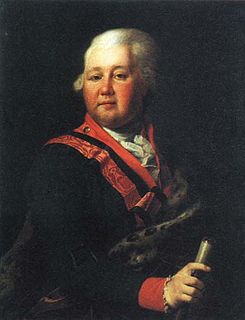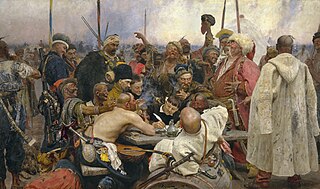
Pugachev's Rebellion of 1773-75 was the principal revolt in a series of popular rebellions that took place in the Russian Empire after Catherine II seized power in 1762. It began as an organized insurrection of Yaik Cossacks headed by Yemelyan Pugachev, a disaffected ex-lieutenant of the Imperial Russian Army, against a background of profound peasant unrest and war with the Ottoman Empire. After initial success, Pugachev assumed leadership of an alternative government in the name of the assassinated Tsar Peter III and proclaimed an end to serfdom. This organized leadership presented a challenge to the imperial administration of Catherine II.

Ivan Semyonovich Zhevakhov, also known as Ivane Simonis dze Javakhishvili was a Georgian nobleman and a general of the Imperial Russian Army. Zhevakhov is known for his participation in the Napoleonic Wars and the Russo-Turkish War (1787–1792) at the Siege of Ochakov (1789).
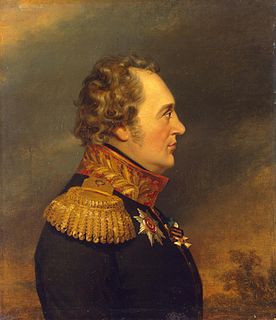
Magnus Gustav von Essen was a Baltic German lieutenant general and military governor of Riga at the start of the Patriotic War of 1812.
Novgorod Viceroyalty was an administrative division of the Russian Empire, which existed in 1776–1796. The seat of the Viceroyalty was located in Novgorod.

Count Charles-Marie de Lambert, was a French Royalist general who fought for Russia during the Napoleonic Wars.
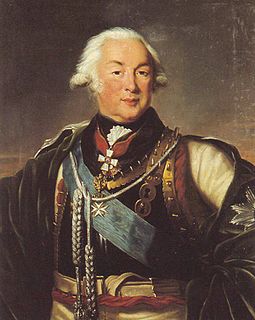
Count Ivan Petrovich Saltykov (Russian: Иван Петрович Салтыков; was a Russian Field Marshal, the Governor-General of Moscow from 1797 to 1804, and owner of the grand estate of Marfino.
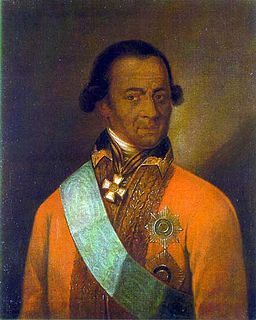
Baron Johann Möller-Sakomelsky ; was a General of the Russian Empire. An artillery expert, he gained fame during the Turkish Wars of the late 18th century.
Vasily Alexeyevich Kar was a Russian general chiefly noted for his defeat in the early stages of Pugachev's Rebellion. His defeat allowed the rebellion to grow into a major threat to the government of Catherine the Great until later army expeditions were able to suppress it. His family name is often transliterated in Western sources as Karr.

Ivan Gavrilovich Blinov was an outstanding Russian calligrapher and miniaturist, bookmaking master, who worked in the traditional manner.

Ivan Ivanovich Zatevakhin was a Red Army Lieutenant general who commanded the Soviet Airborne Forces (VDV) from 1944 to 1946.

Vladimir A. Kossogovsky - was a Russian Lieutenant-General, commander of the Persian Cossack Brigade, and a part of the General Staff of the Imperial Russian Army.
Vladimir Jakovlevich Kachalov was a Soviet lieutenant general. He fought in the Imperial Russian Army during World War I before going over to the Bolsheviks in the subsequent civil war. He was a recipient of the Order of the Red Banner and the Order of the Patriotic War. He was promoted to Komdiv in 1936, Komkor in 1938 and then Komandarm 2nd rank in 1939. He was killed in action at Smolensk by artillery fire. Joseph Stalin, unaware of his death because of an inaccurate report of the events by Lev Mekhlis, stated in Order No. 270 that Kachalov surrendered and defected to the Nazis; he was subsequently sentenced to death in absentia. It was not until 1953 that an investigation established the circumstances of Kachalov's death and cleared his name.

Ivan Vasilyevich Zaplatin was a major of Imperial Russian Army, a bakery butter producer, a deputy of the Second Imperial Duma from the Orenburg Governorate in 1907, who had "moderately progressive" political position. He was the founder of the Ural Union of butter-producing cooperatives (1910), that organized the export of Siberian and Ural butter to Europe. During the Kornilov affair in 1917, he was the commandant of the Tauride Palace and informed the Bolsheviks of the military actions of the Kornilov troops and commands of the headquarters of the Petrograd Military District.

Mikhail Ivanovich Kanashev was a wachtmeister of the Imperial Russian Army, a head of a village and a deputy of the Fourth Imperial Duma from the Orenburg Governorate between 1912 and 1917. He adjoined the Progressive Party, but than became an independent deputy. December 3, 1913 he was a member of a group of 39 parliamentarians who signed the Duma legislative proposal "On the establishment of a special spiritual administration (muftiate) for the Muslims of the North Caucasus."
Mikhail Dratvin was a Soviet lieutenant general. Dratvin's military career began when he was drafted into the army of the Russian Empire during World War I. He subsequently became an expert in the fields of military intelligence and signals, teaching at a number of Soviet military academies and acting as a senior military advisor to the government of China during the Warlord Era and the Second Sino-Japanese War. He fought in World War II and served as a functionary of the Soviet Military Administration in Germany at the conclusion of the war.
Ivan Ivanovich Bakhtin, was a Russian government official and writer.

Ivan Mikhailovich Chistyakov was a Soviet Army colonel general and a Hero of the Soviet Union.
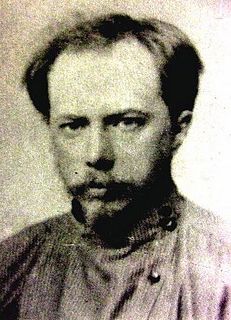
Ivan Ivanovich Gorbunov-Posadov was a Russian, Soviet writer, poet, editor and publisher.













